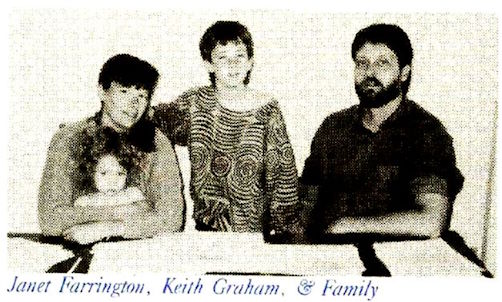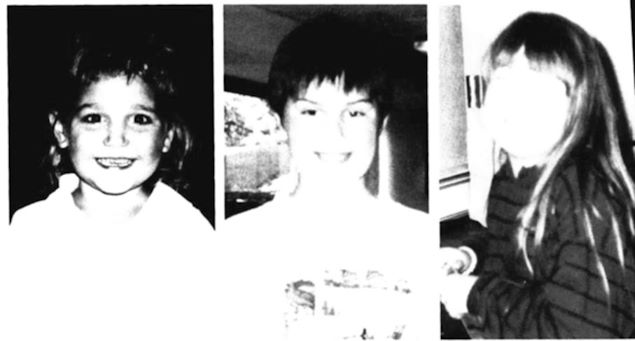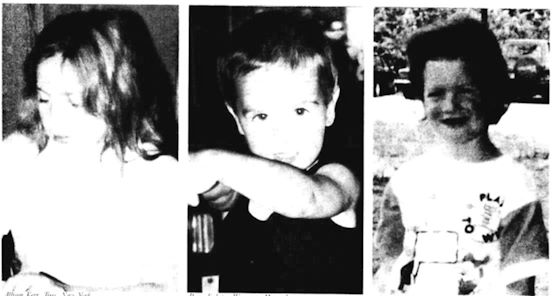© 1992 Janet Farrington and Keith Graham
© 1992 The Fellowship for readers of The Urantia Book
By Janet Farrington and Keith Graham, Brier, Washington

Seventy-eight people took time out from their busy schedules to answer this survey about children in the Urantia movement. 27% of the 286 study groups listed in the 1991 study group directory responded to the survey and are represented in this report covering 27 states in the U.S. and one province in India. 17 people actually wrote personal letters and 8 people volunteered their services to work in the area of children and families.
We thank all respondents for their thoughtful consideration of these questions.
¶ Summary
Responses to this survey indicate a strong feeling that the adult study group is not the place for children but they should get spiritual education based on Urantia Book teachings, either in the home by parents, or with a group of readers.
A decidedly large majority believes The Fellowship should support, in some way, the spiritual education of children. In addition, readers appear willing to use materials produced for children in a variety of settings. However, survey respondents seem to have a wide range of opinions on what materials would be useful and how to use them. Some want study aids, others want creative aids. Some hope for organized groups specifically for children, others see this as strictly a parental concern.
Although there was no separate question addressing the issue of teens, there were comments from many parents indicating a sincere desire for their teens to someday become active readers involved in study group or UB community activities.
Many readers commented on the paucity of families in their area and their desire for some type of community where the children could at least socialize with Urantia Book readers. Several peo- ple wrote about how great it is to be around other readers and their families. And one commented, “When our children were young they enjoved playing with other Urantia Book readers’ children. They all thought Urantia Book people were “Terrific!”
And so do we! Our heartfelt thanks goes out to all those who have responded so enthusiastically to this survey and also to those who have shown such genuine interest in seeing more resources devoted to children in the Urantia movement. As many of your comments reflect, this is work that needs to be done as we build our spiritual fellowship. Your comments and letters and offers to help can be addressed to the Family Life Editor and will be much appreciated.
¶ The Survey
- How long has your study group been meeting? How many readers attend on average? How old is the youngest participant?
- The median age of study groups represented is 8 years. 30% of the groups were less than 3 years old. Only 7 groups ( 9% ) have been meeting longer than 15 years.
- 84% of the groups have ten members or less; 51% have 6 - 10 members, and 33% have 5 members or less.
- Average age of the youngest member is 25 . 25% of the responses have a member younger than 20 years of age.
- Children are:
| 8 or older * |
under 8 yrs.* |
|
|---|---|---|
| - Encouraged to attend | 16 | 11 |
| - Allowed but not encouraged | 14 | 12 |
| - Discouraged from attending | 4 | 9 |
| - Integrated | 10 | 6 |
| - Tolerated but not integrated | 5 | 7 |
| - None in this age group | 32 | 37 |
| - Have a separate group | 5 | 3 |
*No. of responses not no. of groups
- Has the integration of children into study group activities been a “hot” topic for your group?
- For most groups this is not a topic which has generated much debate. However, there were 5 respondents (6%) whose groups have experienced difficulties with the issue, one of which has disbanded as a result. There were 19 (22%) N/A responses to this question.

- What do readers feel/believe about the spiritual education of children?
- The responses to this question are as diverse as the readership. 15% felt that the spiritual education of children needs improvement in some way. Most comments referred to the “dearth of materials” available for children. 23% felt that they were satisfied but there is room for improvement. Many of these noted that the children attend Sunday School at a nearby church (Methodist, Unity, and Quaker were mentioned). Many people wrote that they were very interested and one writer commented about “Jesus having time for children as a natural occurrence…” and implied that our movement should do likewise.
- Three respondents said we should teach the children by example with one reader noting, “As a group we feel that children live and learn by example, so the children must have the feeling that what the parent does . . . pertains to them also.” Our reader in India says, “Teach them young so they will grow in spirit.”
- Three respondents specifically said this was a parental responsibility. There were several comments regarding diversity, such as, “Education is important but the methods will vary.” One respongo to church, some der are very diverse. Some formal religious training, some feel opposed to pursue it. It is tolerate it, others lation int. It is difficult to fit the most recent revetural outlet. We because there is really no culing of forming the “ne the cutting edge, dreamthat children the ”new."’ Four respondents felt ready. 32% had ask for help when they were
- Please list the types of activities available for children in your area.
- 55% of respondents stated that there were no activities available or had no comment. The remainder of the responses listed the activities available as follows:
- Holiday or social events - 10%
- Adult study group where children play - 9%
- Children’s program monthly, annual conference - 9%
- Jesus’ Birthday celebration - 8%
- Sunday school (non-UB) - 6%
- Family campout/retreat - 4%
- What activities would you like to see in your area?
- A high number of respondents said they would like to see study groups specifically for children (20%), while another 6% mentioned a Sunday school program based on UB teachings “with art and music”. Another 6% suggested outdoor activities such as gardening, horseback riding, hiking, campouts, and several people mentioned creative projects. Additional responses in this category include conferences or retreats (2), play groups for Urantia kids (2), worship (2) and 8% mentioned specific materials they would like to see (see question 9 below).
There were 37 N/A answers (47%), with some accompanied by the comment “I wish there were more families in this area.” There seems to be a general hunger on the part of respondents ilies. One reader with Urantia Book reader famaware of the Fatherhrote, "Perhaps part of being hood/Sisterhood of hood of God and the Brotherall activities, wheth humkind is that we view whatever as being school, church, sports, or God’s Urantiaing activities available for us in God’s Urantia schoolroom. As far as separate haps this is not … they would be nice, but perhaps this is not meant to be.”
- What is the most meaningful experience you have had with a child during a Urantia community event?
- 58% of readers responded to this question. 23% reported that working with children in a conference, workshop, or study group setting was sightful natureaders commented on the insightful nature of children, including one reader chays, “When I spent time with children on a consistent basis some months ago, I was amazed and touched by the enthusiasm to study the teachings — particularly in the 5-10 age group.” Another reader wrote about discussions she had with “…one or two children at a time about the UB and its teachings. Finding out how they fit in — or don’t, with their Christian friends and asking what they are most curious about in the UB. When I ask if they own a book most say no. When asked if they would like a book, most said, yes.”
- One reader wrote about a roundhouse discussion with several children discussing what ‘love’ means to them. Another reported that “a twelve year old led the discussion of a paper for an hour and did an excellent job.”
- Six readers specifically said socializing with children was meaningful, with one reader writing “The greatest experience at UB activities is watching these children from varied religious backgrounds develop a spiritual brotherhood amongs themselves.”
- Two readers told of a Michael’s Birthday celebration where “the children wrapped the circle of adults in golden cloth and helped create a worship experience.” Other activities reported included a “Thought Adjuster party when the children turn 5 years, 10 months”, children helping with the Remembrance Supper, and singing. One respondent believes “… when children are raised in an open, loving environment around spiritually fragrant persons, the Father will do the rest.”

- Do you believe the Fellowship should or should not be interested in the spiritual education of children?
- A whopping 82% of the survey respondent believe the Fellowship should be interested in the spiritual education of children. Many readers wert emphatic in their support with comments such as: “It is our greatest challenge.” “Yes, very much so. This has been neglected somewhat.” Another wrote, “Most definitely so! If children get no regular training, they are very likely to end up with no religion at all - or end up believing in some authoritarian ‘religion of the mind’.”
- One reader felt, “It should be a top concern. After all, who is going to carry on where we leave off? I feel it is very important.” A similar comment came from another reader, “Of course they should!!! The children are the future for the material in the book. It can’t always be taken by people who have no background - it must go forward in second, third, and fourth generations.”
- Several respondents commented on the approach needed in the educational process. “We believe that educational activities should start at the earliest possible age. This, however is not the responsibility of the Fellowship but of parents. The Fellowship should encourage and support these activities.” Another wrote, “There should certainly be an interest in fostering and encouraging the spiritual education, but we feel that by no means should this be allowed to turn into some sort of systemized program.” And still another reader felt, “The spiritual education of our children is best accomplished by the folks living their own religion.”
- Although there were many readers who felt adult study groups were not appropriate for children “especially when we get into heavy intellectual stuff,” another felt that, “Young children through adolescence need spiritual education desperately. What better way than to incorporate them into a study group with adults or age group to their liking with adult guidance.” One reader stated, “I think there are things that can be done and it is a good topic to pursue. But most moral training should be in the home. Perhaps ways can be found to reinforce it. I don’t think any special meetings for children should follow a Sunday School type pattern.”
- One respondent stated, “The Fellowship and all readers should be engaged in educating the young with whom they are in contact.” There were seven (9%) unqualified NO answers and seven N/A answers.
- If study aids for children were available, would your group use them?
- 56% of the survey respondents said they or families in their group would use materials if available. 8 readers said they would not use study aids and there were 20 (26 %)$ N/A responses (mostly from those without children).
- Most comments related to the type of study aid, including this from a reader who said, “We should encourage any creativity. Education is a creative experiential process and study aids must not get in the way, but foster it.” One reader commented, “My problem with this is the focus on ‘study.’ I feel that the Fellowship should work to enhance the spiritual culture of families rather than to try and get kids to study.” Another reader said she would use study aids “ . . . in a format that allowed (the children) to be part of the group. I realize that this is difficult and that is why I have had little success keeping my kids (ages 13, 12, 10) in the study group.”
- How to distribute study aids was a concern for some readers, since there are so few children attending study groups. One wrote, “We have no group need but would furnish them to our members who are parents of children for use in the home.” Another respondent similarly felt, “Perhaps we could distribute them to members for use at home. I think Slagle’s book on the early childhood of Jesus is excellent and the type of thing that could prove most useful, especially in a setting of reading to children at bedtime.” Another reader indicated they would not use study aids “Until such time as our child shows an interest in formalized study of The Urantia Book.”
- There were many suggestions for the types of materials for children that should be produced. Topping the list were books or stories for children on the later life of Jesus and other Urantia Book material. Other ideas include a video, a trivia game, coloring books, an idea book for parents, and songbooks. It is interesting to note that topical studies for children were not mentioned although someone did suggest aids for teens to use in the study group setting.
HIGHLIGHTS
- 55% reported that there were no Urantia Book based activities for their children in the area.
- 82% of those responding said the Fellowship should be interested in the spiritual education of children.
- 56% said they would use materials for children if available